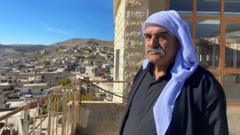In the village of Hadar, located just an hour's drive from Damascus, residents are left to watch and wait as Israeli military forces establish a presence close to their homes. The area has seen an incursion from Israel, which they describe as a temporary seizure of a UN-monitored buffer zone that stems from a decades-old ceasefire agreement. "Maybe they'll leave, maybe they'll stay," resident Riyad Zaidan says, reflecting the community's uncertainty regarding Israel's intentions.
Local village chief, Jawdat al-Tawil, discusses the long-standing history of occupation and defense seen during the Syrian civil war, pointing towards the Golan Heights—a territory seized by Israel during the 1967 war. "We used to resist individuals; Israel is a super-power," he states, illuminating the village's complex relationship with their powerful neighbor.
In response to the recent power vacuum created by the collapse of President Assad's regime, Israel has escalated military operations, citing the need to disrupt jihadist groups along the ceasefire line. Prime Minister Benjamin Netanyahu has also announced plans aimed at doubling the Israeli settlement population in the Golan Heights, emphasizing security concerns.
Different voices from within the Druze community, the primary demographic in Hadar, express mixed feelings about the recent changes. Historically marginalized under Assad's government yet often more accepting of Israel, the Druze see both potential risks and opportunities in the emerging regional landscape. Some residents fear that Israel's ambitions may extend beyond mere military necessity and encroach upon territory.
As the residents come to terms with their current circumstances, they voice predominant desires for peace and stability after years of violence. "We just need peace," pleads Zaidan, signaling the collective exhaustion from ongoing conflict. Amid discussions of past allegiances and changing alliances with militant groups like Hayat Tahrir al-Sham, which recently assumed power, there exists a glimmer of hope for a new era of governance that respects diverse ethnic and religious identities.
Speaking on the complex socio-political dynamics, al-Tawil reflects on the death of his son at the hands of HTS militiamen, highlighting the lingering apprehension about their newfound authority. "They are supposed to rule with justice," he expresses, voicing humanity's enduring desire for peace against a backdrop of tumultuous change.
As the situation continues to evolve, residents of Hadar remain resolute in their aspirations for a stable future amidst the uncertain presence of Israeli forces and the shifting landscape of power in Syria.

















